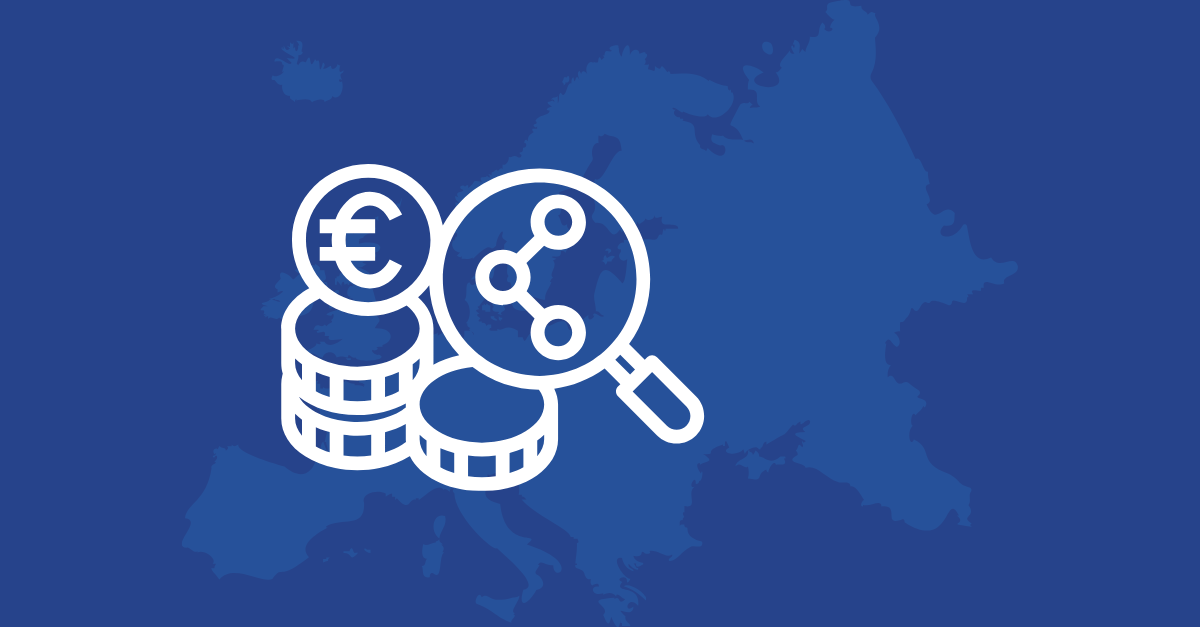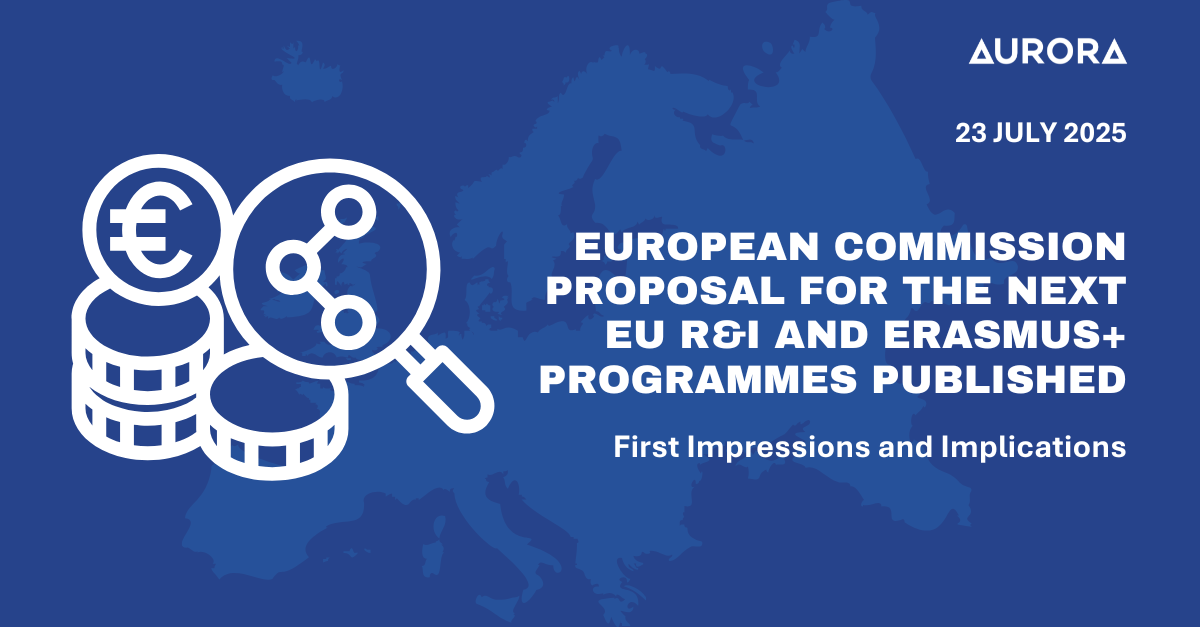European Commission Proposal For The Next EU R&I and Erasmus+ Programmes Published: First Impressions and Implications

On 16 July 2025 the European Commission (EC) published its regulation proposals and plans for the next Multiannual Financial Framework (MFF) period 2028 – 2034, as well as the next EU research and innovation (R&I) programme called Horizon Europe (HEU), the tightly connected novel programme European Competitiveness Fund (ECF), and the Erasmus+ programme. Although the documents have been published, several details of the budgets and the programmes are still lacking. We need to keep in mind that this is the first proposal, whereas both the Member States and the EP will discuss with the EC in trilogues about the final outcome which should be ready by mid 2027. This op-ed article by Pim de Boer, Senior Policy Advisor, and Ramon Puras, Aurora Secretary General, provides a first insight in some of the details and possible consequences for universities including Aurora universities.

What’s New, With What Budget?
The EC proposed a total 7-year budget for the EU of almost 2 trillion (!) euro, spread over the major headers: “National and Regional Partnership Plans”, the “ECF”, “Erasmus+ and AgoraEU”, “Global Europe”, and “others”.
The ECF is a novel programme consisting of HEU as a separate programme, and a merger of 14 current programmes like Digital Europe, EU4Health, LIFE and the European Defence Fund. AgoraEU is also a novel programme streamlining the EU intervention in the areas of culture, media, equality, citizens, rights and values. It comprises the current programmes Creative Europe and Citizens, Equality, Rights and Values (CERV).
A budget of about 409 billion euro is reserved for the new ECF programme, and out of this a 175 billion euro is proposed for the HEU programme. Which is less than the 200 or more billion euro requested for the R&I programme by the EU Member States, the European Parliament (EP) and e.g. the academic sector including Aurora network. Nevertheless, it is almost a doubling of the current HEU budget. For Erasmus+ an increased budget of about 41 billion euro is foreseen, and 9 billion euro for AgoraEU.
These programmes need to address the EU policy priorities: a free and democratic Europe, a strong and secure Europe, and a prosperous and competitive Europe. This includes the themes competitiveness, security, defence, resilience, democratic values, education, social fairness, quality of life, and a global Europe.
Notably, the European Universities Alliances are referenced across all three key publications on the ECF, HEU, and Erasmus+, with their primary anchoring in Erasmus+. This marks a significant evolution from the current programme period and opens promising opportunities for greater synergy between these programmes and associated co-funding schemes. Such alignment would represent a major step forward in integrating research, innovation, valorisation and education through EU funding instruments.
European Competitiveness Fund (ECF)
The ECF will contribute to this focusing on 4 policy priorities:
- clean transition
- digital leadership entailing AI, quantum, cybersecurity, and digital sovereignty
- health, bioeconomy, biotechnology, and agriculture, and
- defence, space, resilience and security.
In brief, the ECF will deal with integrated work programmes across these policy windows, including collaborative R&I, scale-up calls, deployment and accelerated interventions. It will integrate HEU results into downstream industrial and market deployment activities, stimulating the flow of results from basic science towards applied R&I and application. How this will interface with the HEU programme has not yet been detailed in full. Funding mechanisms comprise more complex and hybrid (public-private) funding tools (e.g. equity, guarantees, procurement).
For (Aurora) universities the ECF provides opportunities for taking research results and outputs further to start-ups, and their start-ups to scale ups and beyond, in the context of the given policy windows – clean energy, zero waste, digital technologies and applications, health resilience and (bio) technologies, agriculture, deep tech, security, space (including use of satellite data) and defence including dual-use technologies and civil preparedness. In general, this may require collaboration with business partners and other relevant stakeholders. Other opportunities lie within training and skilling students and staff related to (social) entrepreneurship and dedicated job skills and knowledge as mentioned in the Union of Skills.
Horizon Europe 2028-2034 (HEU)
The HEU programme remains the core R&I programme, fundamentally based on academic freedom and openness, and looks familiar to the current HEU programme. However, it does have major changes as shown in the next figure on the proposed structure:
In brief, HEU will retain the ERC and its instruments with evaluation based on the excellence criterion, MSCA, and (new) the Joint Research Centres in Pillar 1. Aligned with our statement on non-directionality in MSCA instruments, the proposal focuses on research, training, interdisciplinarity in an international setting, and retaining talents in line with the “EU Choose Europe” strategy.
Pillar 2 is about collaborative research. It is unclear for research contributing to the ECF policy windows how this will be governed, which work programmes are acting, or whether early phase collaborative research (at low TRL/SRL) is exempted from the ECF policy windows as we recommended.
Pillar 3 on the EIC and innovative ecosystems retains its current instruments, and possibly new programmatic and extensive instruments like the USA (D) Advanced Research Projects Agencies (ARPA) to support transformative breakthrough projects to provide solutions and applications.
Pillar 4 contains the European Research Area (ERA) policy agenda, research and technology infrastructures, and to widening participation and spreading excellence funding instruments.
Specific aspects: integrating social sciences and humanities (SSH); adhering to Open Science; and simplifying procedures like reduced time to grant, common use of lump sum, and a funding rate of 100% for non-profit and SMEs. Calls will be more open, less prescriptive. In addition, HEU will have an emphasis on international cooperation (hence being connected to Global Europe), new European partnerships will be developed and the programme may “support dual-use actions”.
For (Aurora) universities new opportunities include the less prescriptive nature of calls and potential new types of programmatic financing within the EIC programme. As details on Pillar 2 are not clear yet, we do not know how calls for collaborative research will be developed, with whom, and how this will be governed as well as evaluated, as Pillar 2 apart from “society” is tightly linked with the ECF that has a different governance and separate work programmes. Hence, there is room for improvement as well as co-creation of the programme, its Pillars and work programmes between universities, researchers, and the EC.
Erasmus+ 2028-2034
The Erasmus+ programme will continue to support education and mobility contributing to the resilience and competitiveness of Europe, the green and digital transition, and social inclusion and values. Its goal is to promote high-quality lifelong learning, talent development, and skills for life and jobs. The new structure will contain two pillars:
- learning opportunities including via mobility actions and scholarships in strategic fields, and
- capacity building with partnerships building on e.g. the European Universities Alliances for cooperation, excellence and innovation, and providing support for policy development and systemic innovation in education and youth.
Other important activities include the European degree and/or label, microcredentials, the Union of Skills and lifelong learning, and synergies with HEU and the ECF. The programme supports the strategic areas mentioned under the ECF. This is substantiated by introducing new strategic Erasmus+ grants in key areas (digital technologies, green economy, AI). As mentioned above, the EU priorities mentioned in the Competitiveness Compass (and the ECF regulation) also include education, skilling & training.
Taken together, the European Commission’s proposals for HEU, the MFF and ECF, and Erasmus+ contain several elements of relevance to Aurora universities, most notably:
- Increased Erasmus+, MFF and HEU budget with strategic emphasis
- Continued and visible support for European Universities Alliances through ECF, HEU and Erasmus+ synergies
- Focus on talent, skills, and lifelong learning
- Promotion of democratic values and social inclusion
- Strengthened global dimension through ‘Global Europe’